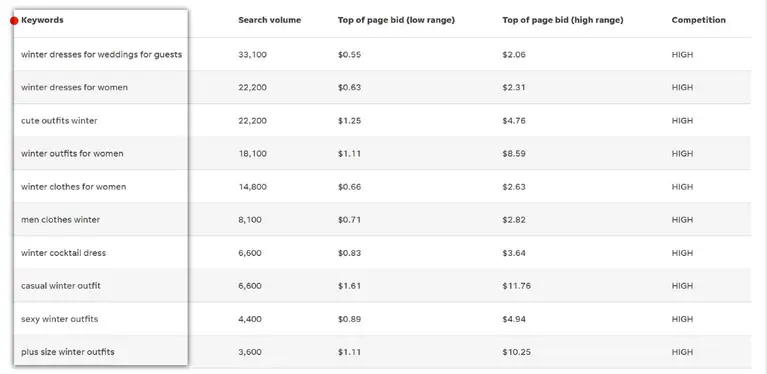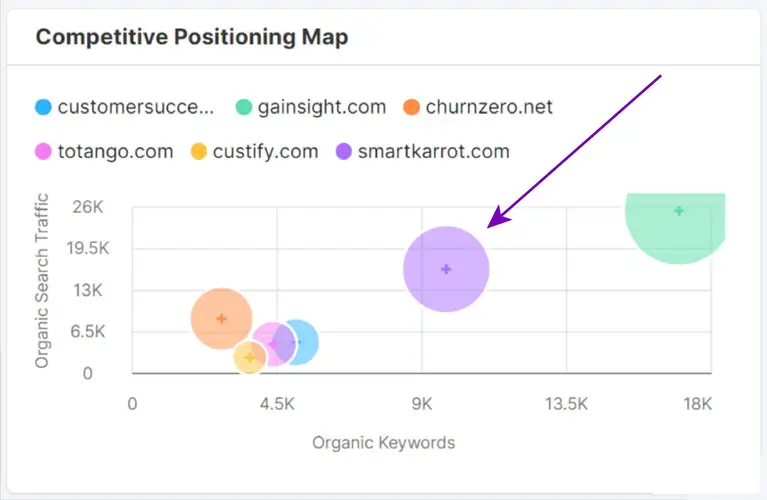
Importance of Keyword Research for SEO
Humans can read and understand what content is talking about.
Unfortunately, search engines don't have this ability.
Yes! Even in 2022, keywords are an important part of SEO. They help search engines understand what your content is talking about.
If you do not include proper keywords in your content, you can bid goodbye to higher ranking and get noticed by your audience.
This guide lists the top reasons why keyword research is important for SEO and why you shouldn't skip it.
So, let's dive in.
7 Reasons Why Keyword Research is Important for SEO
1. Attract Organic Traffic
You’ve probably heard the phrase “Content is king” before. While that’s true, it’s also important to understand that you're missing out on leads, sales, and traffic if people can't find your site in search results.
You should be the first to appear when people search for the services or products. Here's how to direct organic traffic to your website:
- Create An Image Of Your Buyer Persona, i.e., your ideal customer. Put yourself in your reader's shoes and envision what they would type into Google to search your content. Here’s an example of the buyer persona of a healthcare organization.

- Having A Clear Picture Of Your Buyer Persona Will Help You Come Up With Seed Keywords, i.e., initial keywords. You can start by defining your broad topic. For instance, " Life Insurance," and then brainstorm some more specific terms.
Using the right keywords makes your content more visible in the search engines and more organic traffic. Tools like SEMrush, Ahrefs, MonsterInsights, and Rank Tracker will help you optimize your content for better search positioning.
Read: Local SEO Copywriting Tips to Increase Organic Traffic
2. Increased Conversions
Do you know most websites only have a 0.1 to 0.2% conversion rate? It means it takes 1000 visitors to get one customer. Hence, improving the website conversion rate is not a choice but a necessity.
Here's how the right keywords help us improve our conversion rate:
- Your keywords should be specific. Don't use generic keywords such as 'cheap', 'economical', or 'low-cost'. Instead, try using keywords that describe what you are selling. For example, if you are selling a car, try to use words like 'used cars' or 'cars for sale'. You can also use the names of specific brands. For instance, if you are selling a particular model of car, you could use the name of that model.
- Use keyword research tools such as Google Ads, Moz, and Ahrefs to find out which keywords will perform better for you. It helps you analyze the most relevant keywords that can be included in your content.

- Finally, you can find out your conversion rate by using Google Analytics.
3. Prioritize Your Time Like Pro
It's no secret. Keyword research is a time-consuming process. Not all keywords are made equal. Targeting the wrong keywords can waste your resources and keeps you from achieving higher rankings.
That's where keyword research helps you prioritize the most important things. The biggest advantage of researching keywords is knowing what to do, what topic to target, etc.
Here's how to prioritize the right things when researching keywords for your SEO strategy:
- Start with a specific niche in mind. For example, if you are in a fashion niche, you can start with women's winter fashion. It helps you find trending keywords along with search volume and competition.

- Research the keywords. Understand if they are worth targeting. You can use variables like traffic, competition, and search intent to filter the best keywords.
- Note down the potential article where you will include these keywords.
And you're done. Since you already have the best keywords and know where to include them, you won't waste your time with unnecessary things.
4. Insights into current trends
In SEO, things work fast. And by fast, we mean changes every 3 to 6 months. This means you need to keep up with new trends constantly.
Unfortunately, many businesses and marketers don't. You may be using outdated keywords for years, which you might find during your keyword research doesn't work anymore. That's where keyword research forces you to get in touch with reality.
Here's how keyword research can give you a sneak peek into current and future trends:
- Use tools like Google Trends to understand how people react to specific keywords over a while. The below screenshot shows the trend of two keywords around the globe.

- For example, take a fidget spinner. They were a huge trend, but the interest started reducing within a year of skyrocketing to popularity. Now there's little to no engagement for fidget spinners.
- Other keyword tools like Semrush and Ahrefs would also give you tons of important data that will help you understand how consumer behavior has changed over the years.
Read: 11 Powerful Ways to Use Google Trends for SEO
5. Give You Right Direction
The Internet is a vast place. People of all ages and gender with different interests use the Internet. But does that mean you can target them all?
Of course not. If your product is female fashion wear, you cannot target men. That would be a waste of time and resources. This is where keyword research helps you find the right direction. Most people have no idea what keywords to target.
Here's how to target the right keywords :
- Brand Terms. It's best to use branded keywords when people are familiar with your brand—for example, Nike running shoes.
- Geo-targeted Keywords. Best for targeting specific locations. For instance, the Chicago shoe store and its related keywords users search with are shown below.

- Market Segment Keywords. These are generic keywords associated with the industry. E.g., running shoes.
- Customer-centric Keywords. These keywords identify a subset of your audience. E.g., Sneakers for women.
- Competitors Keywords. These keywords target the brand name of competing keywords. An example, for Nike, competitor keywords would be Adidas running shoes.
6. Generate More Topics
Do you keep asking yourself, "What should I write about today?"
If yes, then keyword research is what you need!
If you are already finding keyword ideas for topics you are writing, you will also find the related keywords that people are searching for. These related keywords can become your new topic.
You can even check for topics in Google’s ‘related search’ at the bottom or in Aherfs ‘questions’ section of keyword research, as in the screenshot.

Here's how to use keyword research to generate more topics.
- Find Your Target Keywords. Try to gather as many relevant keywords as you can in one sitting since this process is time-consuming. It's better done at once.
- Prioritize The Right Thing. Choose keywords based on volume, difficulty, topic efficiency, and other identifiers for best results.
- Now, Keep Yourself In Your Customer's Shoes. If you are reading about gardening in winter in the USA, what would you like to read about gardening? It can be about gardening tools, best soils, best seasons for vegetables, etc.
7. Help Access Competition
You cannot just forget about your competitors when it comes to SEO. But unfortunately, most people completely forget about competition and go with the idea they like.
The result is always a failed business. This is because the business cannot compete with the large competitors with full pockets.
A prime example of this is the health niche. Being an extremely competitive niche, you will need a large budget to compete with your competitors. Top sites like WebMD and Healthline all have considerable authority, which a new website just cannot think of competing with.
This is where keyword research will help you.
- It will help you understand your competitors deeply. Once you are done with research, you will know exactly whether the keywords are worth targeting. Use tools like SEMrush to find the top competitors competing with your website and use them to enhance your pages.

- Best of all, keyword research can also lead you to find another niche within the health niche where the competition is low. For example, you can target low competition niches like 'Health Tips For People Over 50'.
SEO & Keyword Research - FAQs
1. Why Is Keyword Research Important?
Search engines cannot read like human beings. As a result, they often rely on keywords to understand the topic of your blog or your website. That's why keywords are major ranking factors in SEO.
2. How To Perform Keyword Research?
The best way to perform keyword research is through tools. There are many keyword research tools available in the market. Popular tools include Ahrefs, Semrush Keyword Planner, etc.
3. How Do The Right Keywords Improve Conversions?
Keywords can be divided into various types, namely transactional, navigational, and informational. Hence, it's important to target the right keyword to improve conversion. Users ready to buy would use transactional keywords, whereas users searching for information would use informational keywords.
4. How Do I Know What Keywords To Target?
One of the best strategies to understand what keywords to target is to keep yourself in the customer's shoes. Identify your target audience and think about what they would search on Google when they want to buy anything.
Key Takeaways
- Leverage keywords to find new topics.
- Keep yourself updated with the latest trends by keyword research.
- Access your competition.
- Find the right direction.
- Gain organic traffic with the right keywords.
- Improve conversions by understanding search intent.
ABOUT THE AUTHOR:
Brice Decker

Brice has been handling marketing projects for more than 12 years and he is providing consulting services on SEO, Social Media and PPC. He has a huge expertise in working at large corporations including Accenture Interactive & PwC Digital Services.
ABOUT THE AUTHOR:
Brice Decker

Brice has been handling marketing projects for more than 12 years and he is providing consulting services on SEO, Social Media and PPC. He has a huge expertise in working at large corporations including Accenture Interactive & PwC Digital Services.
Related Post
How to Rebrand Your Business Without Losing SEO?